Introduction
In a world where wellness is increasingly recognized as a cornerstone of productivity and success, understanding the nuances of hormonal belly fat becomes essential for fostering a healthier workplace. This type of fat, often resistant to traditional weight loss methods, is not just a cosmetic concern; it signals deeper hormonal imbalances that can affect both physical health and emotional well-being. With approximately 30% of adults grappling with these imbalances, HR Benefits Managers are uniquely positioned to implement strategies that support their teams in overcoming this challenge.
By exploring the interplay of hormones, lifestyle factors, and effective management techniques, organizations can create a culture of health that empowers individuals to take control of their well-being, ultimately leading to a more engaged and productive workforce.
Defining Hormonal Belly: Understanding the Basics
Hormonal abdominal fat is characterized by the accumulation of fat around the abdomen, primarily driven by fluctuations in hormones. This type of fat is distinct from general weight gain, as it often proves resistant to conventional diet and exercise methods, leading to frustration in weight loss efforts.
Comprehending belly fat associated with hormones is essential, as it is linked to serious health issues connected to hormonal imbalances. Recent research indicates that approximately 30% of adults experience imbalances that contribute to increased abdominal fat storage, highlighting the prevalence of this issue.
Furthermore, changes in hormones can lead to physical challenges, such as increased fat accumulation, as well as emotional difficulties that can affect workplace dynamics. According to specialists, 'stress plays a vital role in how endocrine imbalances impact both physical and mental well-being,' highlighting the interconnectedness of these factors.
Case studies indicate that individuals with fat around the abdomen frequently report increased levels of stress and anxiety, which can sustain a cycle of wellness problems. By recognizing these factors, HR Benefits Managers can take proactive steps to support their teams, fostering a more informed and health-conscious workplace culture.
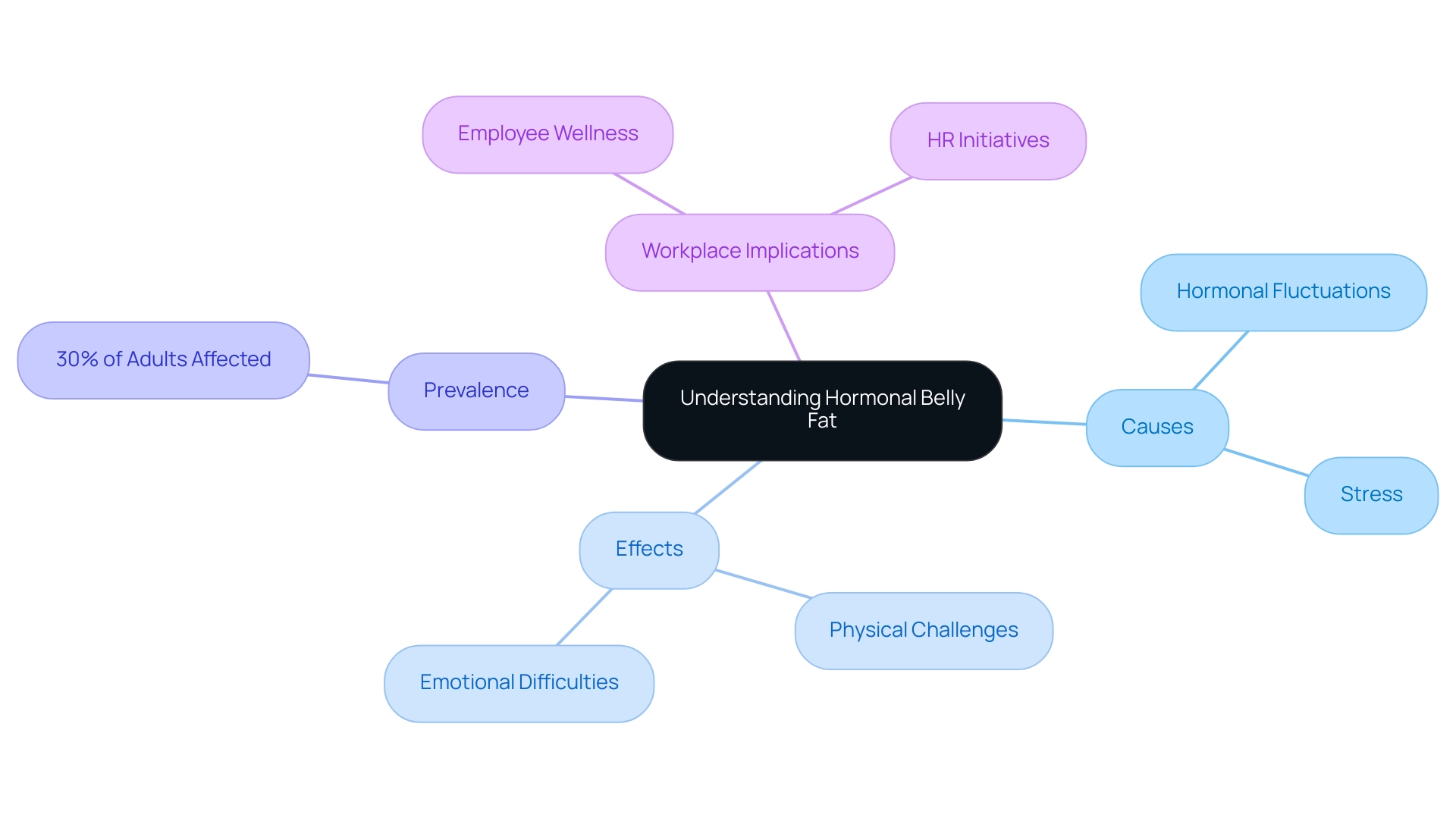
The Role of Hormones in Belly Fat Accumulation
The interplay of hormones such as insulin, cortisol, and sex hormones is pivotal in the regulation of fat storage, particularly in the abdominal region. Insulin, a key hormone in blood sugar regulation, can lead to increased fat storage, especially when its levels are consistently elevated due to unhealthy dietary choices or chronic stress. Dr. Jane Smith, an endocrinologist, notes, "Elevated insulin levels can create a cycle of fat storage that is difficult to break, particularly in the abdominal area."
This condition can be exacerbated by cortisol, often dubbed the stress hormone, which has been shown to promote fat accumulation during prolonged periods of stress. Additionally, fluctuations in hormones associated with life stages, such as menopause or conditions like polycystic ovary syndrome (PCOS), can significantly contribute to the buildup of fat in the abdominal area.
A recent study highlighted that a 25% improvement in insulin sensitivity is clinically meaningful, indicating the potential for effective interventions. Identifying these biological influences is not only vital for personal well-being; it also acts as an encouraging element for HR Benefits Managers to promote workplace wellness programs that tackle these important facets of well-being.
To assist your group in managing weight-related fat, consider incorporating our comprehensive wellness coaching app. It offers personalized workouts, nutrition guidance, and daily programming that keeps users on track with their goals, empowering individuals to take action in their health journeys. The app also facilitates one-on-one coaching through direct messaging, ensuring that users receive the personalized support they need.
Moreover, it connects them to a community of like-minded individuals for motivation and encouragement, reinforcing the benefits of shared experiences. Furthermore, resources like helplines and support groups can boost motivation and offer useful information for weight control, demonstrating how thorough support can assist individuals in managing weight-related fat.
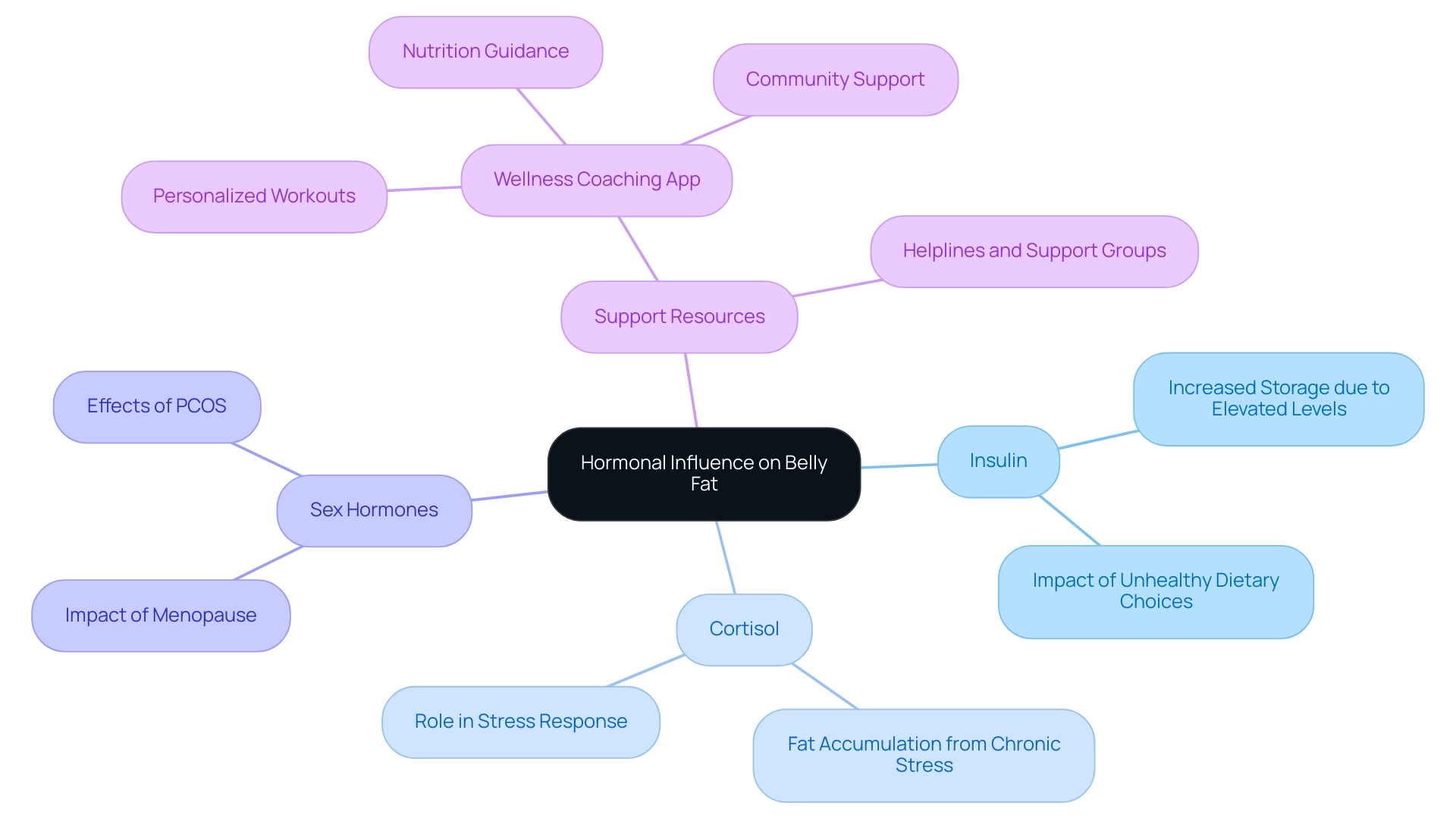
Identifying Causes: From Menopause to Lifestyle Factors
Belly fat related to hormones is influenced by a variety of factors, particularly shifts experienced during menopause. As estrogen levels decline, studies show that up to 90% of women report an increase in abdominal fat during this transition. Conditions such as polycystic ovary syndrome (PCOS) further complicate this issue, disrupting balance and contributing to weight gain.
For instance, a recent case study highlighted that women with PCOS often struggle with weight management due to insulin resistance, which exacerbates fat accumulation in the abdominal area. Lifestyle factors play a critical role as well; poor dietary choices, insufficient physical activity, chronic stress, and inadequate sleep can exacerbate these challenges.
For example, research indicates that women who engage in regular physical activity can reduce their risk of weight gain during menopause by up to 50%. Recognizing and understanding these causes is the first step toward empowerment, enabling individuals to take proactive measures for their health and well-being.
Dr. Monica Christmas, Director of the Menopause Program at the University of Chicago Medicine, highlights the importance of reframing our approach to these changes:
If we think about it in a different way of just, this is what it is.
This viewpoint motivates women to adopt a comprehensive strategy that involves lifestyle changes and assistance, which is crucial for effectively managing weight related to hormones.
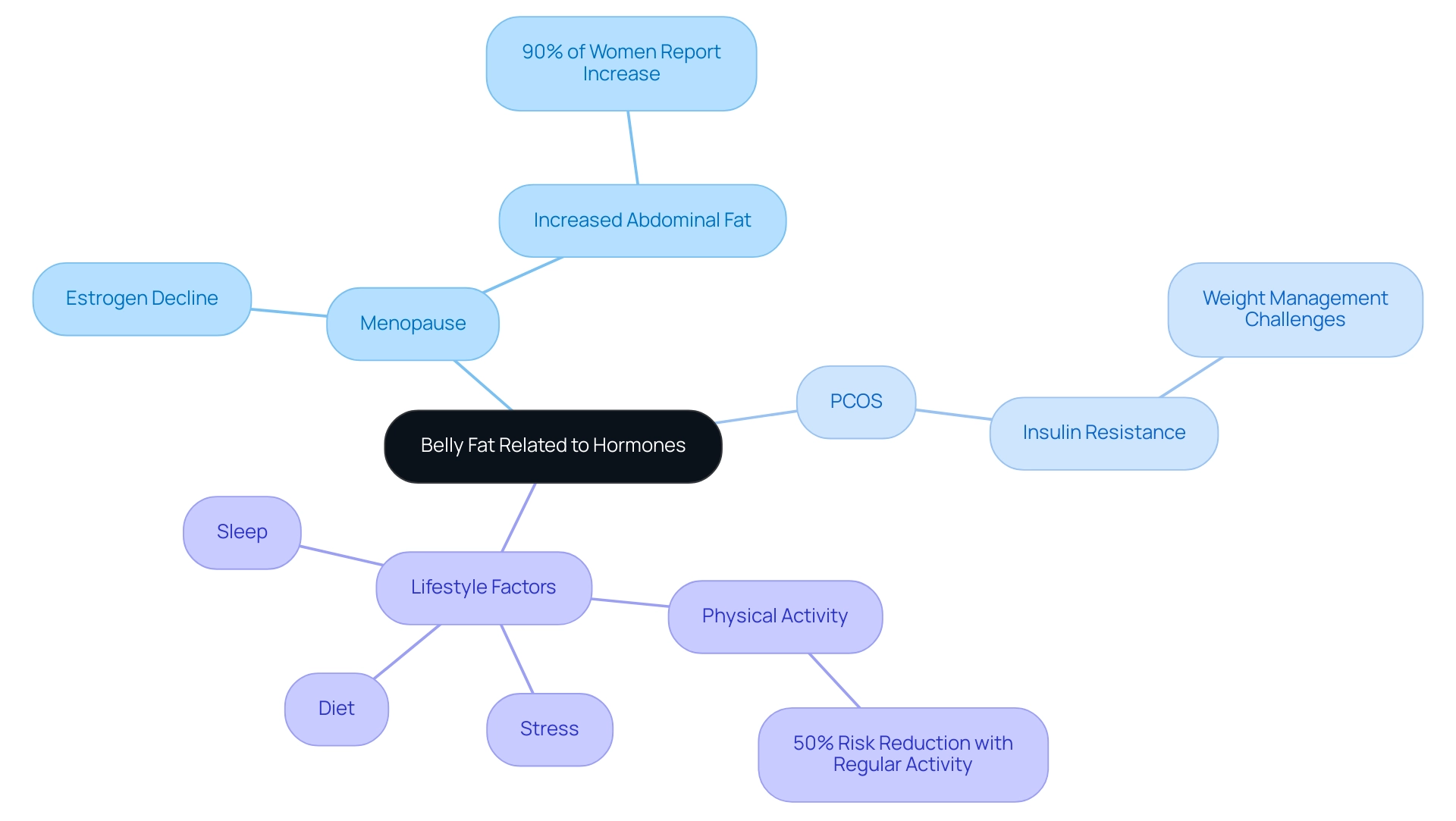
Effective Strategies for Managing Hormonal Belly Fat
To effectively manage hormonal belly fat, it's essential to embrace a holistic approach that prioritizes your well-being. Start by implementing these empowering strategies through our comprehensive health coaching services:
- Dietary Adjustments: Focus on a nourishing diet abundant in whole foods, including a variety of fruits, vegetables, lean proteins, and healthy fats. Lowering sugar and processed carbohydrate consumption can stabilize insulin levels, essential for maintaining balance. A nutritionist highlights that dietary changes play a crucial role in managing bodily function. Additionally, our personalized coaching can help navigate complex dietary choices, ensuring you make informed decisions.
- Regular Exercise: Commit to a routine that incorporates both aerobic activities and strength training. Aim for at least 150 minutes of moderate aerobic exercise each week, alongside muscle-strengthening activities on two or more days. Statistics show that regular physical activity can help reduce body fat, with a study indicating that individuals who engage in regular exercise can achieve a 5-10% reduction in body weight over time, significantly contributing to weight management and overall health. Our tailored fitness coaching will keep you engaged and motivated.
- Stress Management: Integrate stress-reducing practices such as yoga, meditation, or deep breathing exercises into your daily routine. These activities are essential for reducing cortisol levels, which, when increased, can lead to weight gain and endocrine imbalance. Our wellness workshops provide valuable tools for stress management, fostering a supportive community.
- Adequate Sleep: Prioritize 7-9 hours of quality sleep each night. Insufficient sleep disrupts balance of hormones and can lead to weight gain, making restorative sleep a critical component of your wellness journey. Our coaching highlights the significance of sleep hygiene as part of a comprehensive wellness strategy.
By implementing these lifestyle changes through our tailored coaching and extensive programs, you can not only greatly decrease fat around the abdomen but also improve your overall well-being. Remember, every small step you take toward these changes is a step toward a healthier, more balanced life.
Testimonials:
- "Foresight Health Coaching transformed my approach to wellness. The personalized guidance helped me lose 15 pounds and feel more energetic than ever!" - Sarah T.
- "The comprehensive coaching program not only helped me manage my hormonal belly fat but also improved my overall health. I highly recommend it!" - James L.
Pricing Information:
Our coaching services are designed to be accessible. Individual coaching sessions start at $100 per session, with packages available for those looking for ongoing support. Corporate memberships are available starting at $1,500 for up to 30 employees, including all services mentioned above. For detailed information on our packages and to discuss how we can support your wellness goals, please contact us directly.
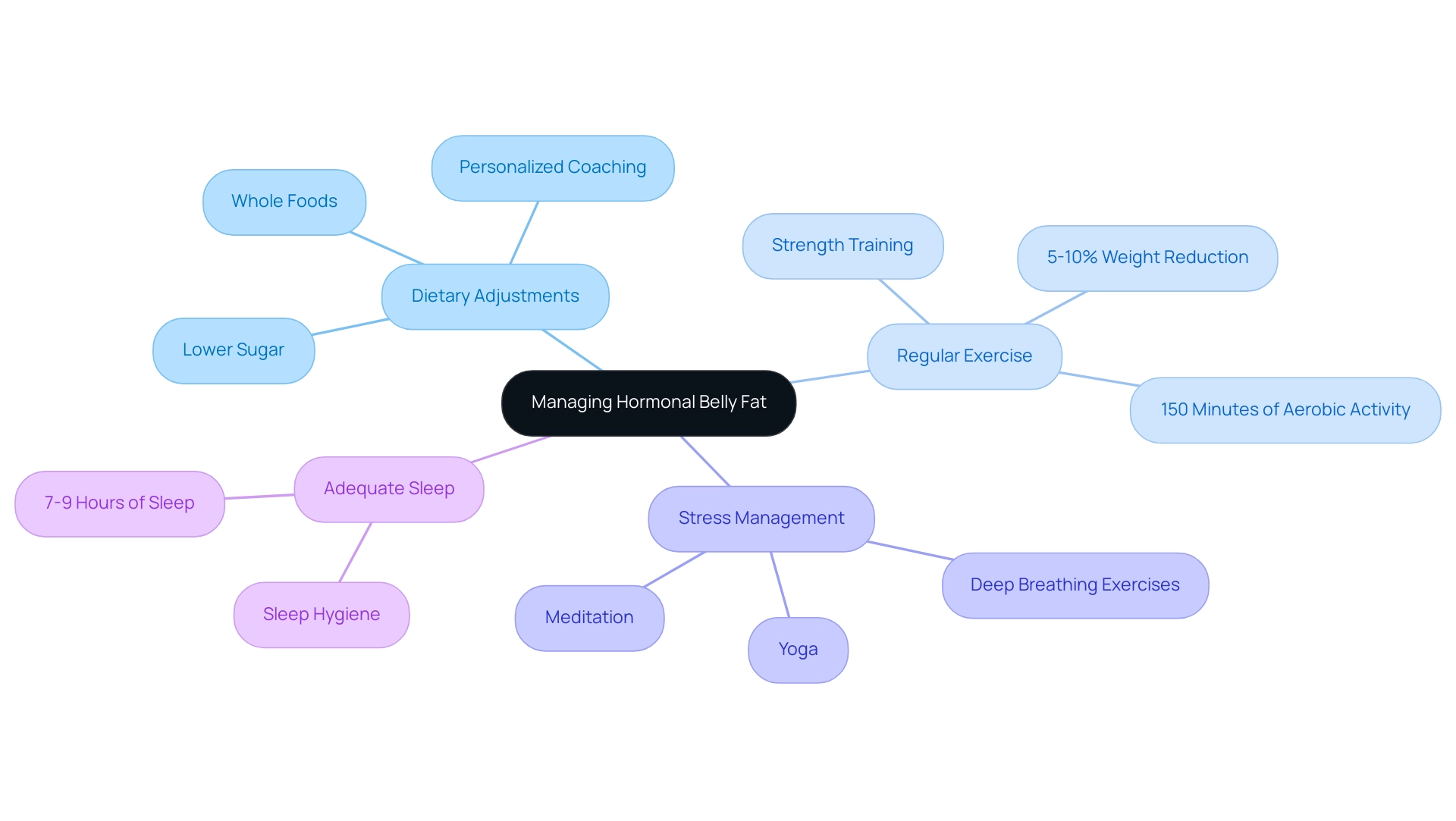
Health Risks Linked to Hormonal Belly Fat
Hormonal belly fat extends beyond mere appearance; it is intricately linked to significant risks, including an increased likelihood of chronic diseases such as type 2 diabetes, heart disease, and specific cancers. In fact, studies show that individuals with excessive abdominal fat have a higher prevalence of type 2 diabetes, which is a critical concern. The presence of excessive abdominal fat can also contribute to metabolic syndrome—a combination of conditions that elevate the risk of heart disease and stroke.
Recent studies have highlighted alarming statistics, such as the fact that women who lead sedentary lifestyles can lose approximately 1% of bone mass annually, underscoring how inactivity exacerbates the aging process and contributes to these risks. Furthermore, the PAGE reports that endocrine imbalances associated with abdominal fat may elevate breast cancer risks by 20% to 80%, depending on study population and methodology. The NPAGCR also indicates that exercise can lead to a 30% reduction in endometrial cancer risk, emphasizing the importance of physical activity.
Real-world examples, such as the situation of cosmonauts facing considerable bone density decline during extended space missions because of the lack of gravitational forces, emphasize the importance of sustaining an active lifestyle to promote overall well-being. By proactively addressing the challenges posed by hormonal belly fat, individuals can significantly enhance their quality of life while mitigating the risk of serious health complications.
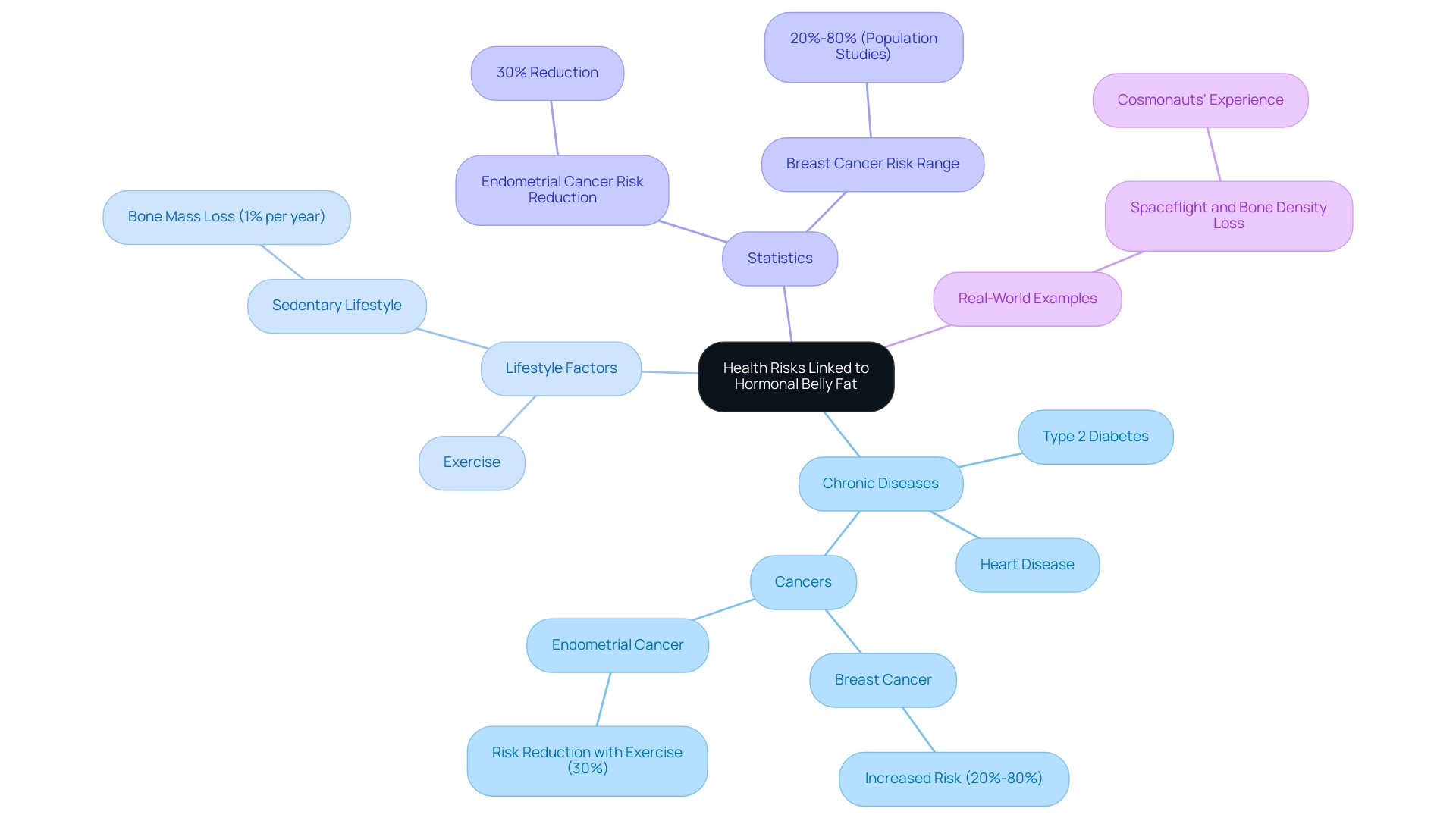
Conclusion
Understanding and addressing hormonal belly fat is crucial for fostering a healthier workplace environment. As highlighted throughout the article, this type of fat is linked to significant hormonal imbalances and associated health risks, affecting approximately 30% of adults. By recognizing the interplay of hormones like insulin and cortisol, as well as lifestyle factors such as diet, exercise, and stress management, HR Benefits Managers can implement effective wellness strategies that empower their teams.
The article emphasizes the importance of taking a holistic approach to managing hormonal belly fat. By prioritizing dietary adjustments, regular exercise, stress reduction, and adequate sleep, individuals can significantly improve their well-being and reduce the risk of chronic diseases. Additionally, leveraging resources such as personalized coaching and community support can further enhance motivation and facilitate positive lifestyle changes.
Ultimately, creating a culture of health not only benefits individual employees but also contributes to a more engaged and productive workforce. By taking proactive steps to address hormonal belly fat, organizations can inspire their teams to take control of their health journeys, leading to lasting improvements in both physical and emotional well-being. Now is the time to champion these initiatives and foster a supportive environment that prioritizes wellness for all.




